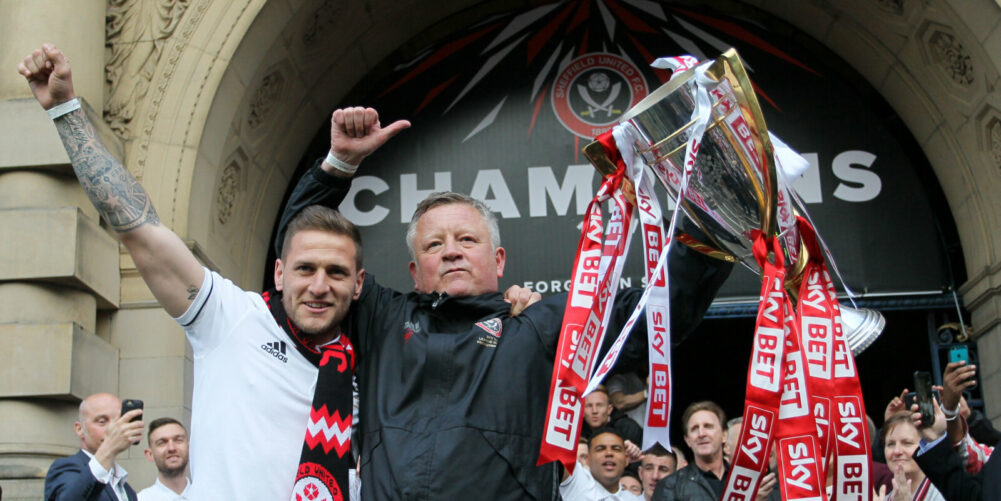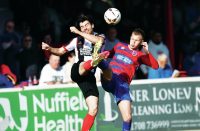By Chris Dunlavy
Today, Chris Wilder is the reigning LMA Manager of the Year, pitting his wits against the likes of Pep Guardiola, Jose Mourinho and Jurgen Klopp at the business end of the Premier League.
As things stand, his swashbuckling Sheffield United side are just two points adrift of Manchester United in the final European spot.
Yet 19 years ago, the Sheffield United boss was a managerial greenhorn finding his feet with Alfreton Town in the ninth tier of English football.
Wilder would spend the next decade in Non-League, overcoming redundancy at Halifax Town and suffocating expectation with Oxford United before promotion from the Conference in 2010 launched his career into the stratosphere.
Here, the 52-year-old recounts those formative years – and says shackling Mo Salah, Sergio Aguero and a myriad other international superstars is a doddle compared to escaping the National League.
In his twenties, Wilder combined a full-time career as a full-back in the Football League with managing local side Bradway in the Sheffield Sunday leagues.
“I learned pretty early that there are all sorts of different characters in a changing room,” he reflects. “Some want to learn and are already interested in life after playing. Some, I don’t think are even bothered about football in the first place. It’s just a job.
“I was definitely the first one. I took my badges in my twenties. I’d watch pals who played on Sunday mornings. I’d go anywhere to see a game, to be quite honest. Even kids’ football.
“I was never one of these players who thought ‘Oh, I’ve played Championship so I’m too good for all this’. My dad played Non-League, so did my uncle and several of my mates. I knew there was a world beyond league football and I had a lot of respect for it.
“But because I did play at a good level, my pals would tentatively ask for advice. Before long I was managing the team.
“I got a few old mates in like Billy Whitehurst and we were very successful. It all went from there.”
Wilder retired in 2001 after 414 games in the Football League for the likes of Sheffield United, Rotherham United and Bradford City.
Aged 33, he signed for Alfreton Town of the Northern Counties East Premier Division and was named manager in October 2001. In charge for just 27 weeks, he won four trophies, including the title.
“I joined Alfreton at a time in my life when I was still assessing what to do. I’d picked up a back injury playing for Halifax and within six months I was forced to retire.
“I’d always imagined playing in the Football League until 35-36. Now, all of a sudden, that wasn’t an option. It was more a case of ‘S***, what do I do now?’
“I could still play semi-pro, and that’s why I joined Alfreton – to play. But when the manager got the sack after a few bad results, I was the most senior person in the dressing room.
“The chairman – and he’s still there now – is a fella called Wayne Bradley. He’s someone I’ve got a lot of respect for and to this day is one of the best people I’ve ever worked for. Brilliant for a first-time manager.
“He knew what I’d done in Sunday football and asked if I’d keep things ticking over. I won a couple of games, got asked to go a bit longer and we ended up winning four trophies.
“It was a brilliant effort, but it wasn’t exactly Leicester winning the Premier League. With the team we had, we should have done what we did.
“Alfreton were a bloody good side. Well backed. One of the favourites. I was one of several who had Football League experience.
“I also managed to bring a few pals in – people like John Beresford, who weren’t playing at their clubs and helped us out. I’ve known Bez since I was 12 or 13. He had a brilliant career at Newcastle but he had no airs and graces. He just wanted to play football and that was the scene around Sheffield back then. It was full of people like that.”
In 2002, Halifax Town became the first team to be relegated to the Conference twice. Narrowly saved from liquidation by a consortium of local businessmen, the Shaymen hit the division in a desperate state.
Wilder was approached, answered the call, and gradually built a side that challenged for promotion. But after losing a thrilling play-off final 3-2 to Hereford in 2006, financial problems mounted and the club went out of existence two years later.
“Joining Halifax was a very difficult choice because everything was there for me at Alfreton. A lovely training ground, good facilities. Ambition, money, quality players.
“Halifax didn’t have anything. That first year, we had no training ground, no players, no equipment, no pre-season friendlies, no staff. No structure to anything. My biggest achievement was getting a team out on the pitch.
“So to have got them to within touching distance of the Football League is one of the highlights of my career, no question.
“We had a great team that 2005-06 season. Danny Forrest, Lewis Killeen, Martin Foster. And we only got done by an extra-time goal in the play-off final. It was a hell of an effort.
“Trouble was always coming, though. When I arrived, ten local business people put £10,000 in each, so £100,000 total. That’s not a lot of money to start up in the Conference. We worked off that and did OK, but underneath it all was a debt that wouldn’t go away.
“It was there through an overspend in the Football League and a stand that never got built. They owed a lot of money to local business people and contractors.
“We never added to it, but we couldn’t clear it either. Our only hope was promotion or an investor who would take over.
“We went into administration twice. Second time, everybody was thinking that our creditors would do the right thing.
“We still ran a youth team. We still had football in the community. We gave jobs to a lot of young lads.
“But one local builder made the decision that he wasn’t prepared to accept our proposal and, in a day, that was it.
“I remember the meeting clear as day. We were all sitting there, waiting for the news to come through. Then it did.
“The history of Halifax Town, all 97 years, gone on a decision we couldn’t do anything about.
“All of a sudden I’m walking into a changing room with 15-16 people and saying ‘Sorry, boys, the club is gone’.
“I was there for a long time. Three or four times I got offered jobs and, looking back, I was probably pretty naive not to go.
“But it never felt right to walk away. It was my club. My players. I’d signed them, coached them and looked after them. So to then say ‘Sorry, you’re no longer a professional footballer’ was a pretty horrendous afternoon.”
After leaving Halifax, Wilder joined Bury as assistant to Alan Knill – a situation now reversed at Sheffield United with Knill the No.2. However, Oxford United came calling in December 2008.
Relegated from the EFL in 2006, the U’s were arguably the biggest side ever to play Non-League football, yet had struggled to find their feet at the lower level.
Wilder immediately set about reshaping the team and in 2009-10 his team beat York City in a one-sided play-off final at Wembley to earn the then 42-year-old a shot at the Football League.
“By the time I got to Oxford, I knew the Conference. And I knew it didn’t favour big ex-Football League clubs.
No disrespect to their achievements, but I always thought the pressure was off an Accrington or a Stevenage. It was always on the likes of us and Luton. We were a target.
“I’d watch teams play against us, then I’d watch the game afterwards. And you would not believe the difference in performance.
“I remember playing at Mansfield, our first defeat of the season, and it was ridiculous. Their levels were through the roof.
“To make matters worse, the club had got a load of Football League players in who didn’t know what it was like to play at Histon on a Tuesday night. Who didn’t know what it was like at Eastbourne, or Barrow in the middle of winter.
“What we tried to do was find players who did. The bulk of the team were lads who had been successful in the division before.
“Damien Batt at Barnet. James Constable and Mark Creighton for Kidderminster, the likes of Anthony Tonkin, Matt Green, Jack Midson, Dannie Bulman. Proper men. Proper leaders.
“It wasn’t rocket science. It’s such a tough division, psychologically and physically. We were up against it more than any other team in the division, every single week.
“So you fill your team – like we did at Sheffield United in League One – with lads who know the level and can navigate themselves through that situation.
“Financially, it wasn’t easy. From the outside, Oxford looked like a huge club. But we didn’t own the stadium. So for every gate of 4,000, it was like having a gate of 2,000. Half the gate receipts went to Firoz Kassam.
“We had to duck and dive, beg, steal and borrow. Constable, who scored 26 goals for us that year, is a great example.
“We didn’t sign James as a football club – it was the punters.
“Stewart Donald, who now owns Sunderland, took out a ten-year box with his dad and paid for it up front. They basically paid the fee.
“There was this image of this big powerful football club but we didn’t have a pot to p*** in really.
“What we did have, though, was incredible support. In the semi-finals we took 4,000 to Rushden, then had a full house at home. At Wembley, there was a crowd of 40-odd thousand and 30,000 of them were Oxford fans.
“Yes, we fell short in the league. Stevenage, credit to them, got a jump on us and saw it out. But when I look back now, that league was so strong. We played Luton, York, Cambridge, Wrexham. Rushden & Diamonds, who were very powerful at the time. There were eight or nine clubs who would comfortably have dealt with the Football League, and only one automatic place.
“It’s the hardest league by an absolute million miles to get out of. And for all the challenges I’ve faced at Premier League level, it’s still the hardest league I’ve experienced in my career. No question.”
Wilder hopes his rags-to-riches story will inspire more Premier League owners to peer down the pyramid for a new manager – but the 52-year-old isn’t holding his breath.
Ten Brits currently occupy top-flight dugouts. Yet Roy Hodgson (Crystal Palace), Brendan Rodgers (Leicester City), Steve Bruce (Newcastle) and Nigel Pearson (Watford) were all chosen based on prior experience, whilst Frank Lampard’s appointment by Chelsea owed less to a brief apprenticeship at Derby County than his legendary status at Stamford Bridge.
Like Wilder, Dean Smith (Aston Villa), Eddie Howe (Bournemouth) and Sean Dyche (Burnley) all had to earn their own berth by getting a team promoted, leaving Brighton boss Graham Potter – headhunted from Swansea City last May – as the solitary manager plucked from below.
“I think it’ll always be the same in the EFL and Premier League,” says Wilder. “Purely because of the number of foreign owners at those levels.
“It will always be a very successful foreign manager, an ex-international player who goes straight in or someone with prior experience. Young English managers do get overlooked.
“I always knew – and I’d imagine Eddie Howe and Sean Dyche are the same – that the only way I’d ever get there would be to take a team up.
“It’s a shame. I think there’s a lot of quality coaches and managers, not just in the Football League, but several levels below.
“But for one reason or another, they just don’t get a break of the ball. We all need that.
“All you can do is carry on, like I did for five or six years at Halifax. Because I was the same person I am now.
“The pillars that underpinned everything at Alfreton are still there in the Premier League. You improve through experience, you try not to repeat mistakes – that’s key.
“But the team, the togetherness of the group, the work ethic, playing positively – all the things I try to implement now were there back then.
“I just needed someone to take that chance. You don’t get many of those, but the story is a decent one.
“And, hopefully, if one or two more can do what myself and Eddie have done then it might change perceptions.”





















